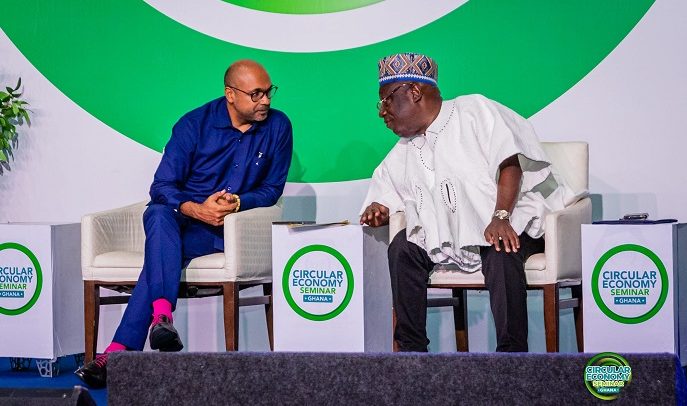EU Ambassador in conversation with Dr. Kwaku Afriyie at the Circular Economy Seminar in Accra
The government in partnership with the European Union (EU) has intensified awareness on use of natural resources and the creation of sustainable growth and jobs, otherwise known as the circular economy.
At the launch of the 3rd edition of the Circular Economy competition in Accra, EU Ambassador to Ghana, Irchad Razaaly, established that Africa is gradually stepping up as a major partner to achieve the joint ambitions to halt biodiversity losses, noting that majority of the African countries are now embracing the circular economy model.
“The EU in Ghana cooperates with the Government of Ghana on Circular Economy. It supports skills development and entrepreneurship for green jobs, recycling projects, and green energy in Ghana,” he said.
He also lauded the government’s commitment to supporting the transition to a circular economy, indicating that, Ghana has generally led the implementation of policy instruments that support greener economic development across Africa and these policies will enable the proliferation of the circular economy in the country.
Ambassador Razaaly further emphasized the relevance of the circular economy competition indicating that “the contest will help small businesses and start-ups to become visible and grow to accelerate the transition to a greener, circular economy”.
Minister of Environment, Science, Technology, and Innovation, Dr. Kwaku Afriyie, averred that Ghana seeks to identify its economy to create export revenue and improve labour and capital productivity, adding, “It also aims to become a global leader in the transition to a circular economy”.
The sector minister also reminded stakeholders about the need for all to contribute to environmental protection by thinking and acting circularly at all times.
“Transitioning to a circular economy will be advantageous to Ghana and will help the country generate decent jobs, reduce inequality, minimize the impact of climate change on the environment, and provide the economy with a competitive advantage,” he added.
BY Prince Fiifi Yorke & Ebenezer Amponsah


